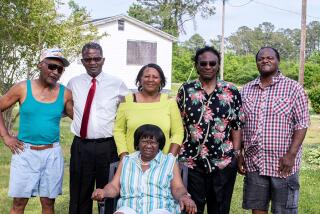Katrina, from the front lines
- Share via
“Trouble the Water,” a stirring documentary on Hurricane Katrina and its aftermath, is more than a keenly dramatic look at how this country treats the poor and dispossessed. It’s also a film that was hijacked by its subjects. They saw an opportunity, they took it, and the grand jury prize at Sundance was the result.
In fact, the opening scene of “Trouble” shows exactly how it happened. New York documentarians Tia Lessin and Carl Deal, longtime associates of Michael Moore, were in Alexandria, La., interviewing people at a Red Cross shelter when Kim Roberts and her husband, Scott, literally walked into the frame.
“I want to tell people what I been through,” Kim says on camera about home movie footage she shot in New Orleans’ Lower 9th Ward as the flood unfolded. “This needs to be worldwide. Nobody’s got what I got.” Which turned out to be both true as well as no more than half the story.
Kim Roberts’ footage, shot with a video camera she’d bought on the street for $20 only the week before, gives a rare from-the-ground-up look at what it’s like to be flooded out of your house. We watch in hypnotized horror as the waters rise so high they almost obliterate the corner stop sign, forcing the Roberts and their extended family to take precarious refuge in their attic.
Startling as that footage is, however, it takes up only about 15 minutes of “Trouble the Water.” The documentary’s best asset is not what Kim shot, but the woman herself.
With her buoyant, naturally dramatic personality (she ended up giving birth to a daughter in Utah just days before the Sundance award ceremony), bold, nervy Kim has the kind of intensely charismatic spirit documentary directors dream about. With her as our guide, “Trouble the Water” looks at the reality of New Orleans from the inside.
The tour starts before the flood does, with Kim showing us a hard-scrabble neighborhood of genuine poverty, but revealing the spirit and sense of community of “the world we had before the storm.”
“Trouble” really kicks into gear after the flood, when the Roberts’ experiences and those of family members and friends expose how things went down. As Danny Glover, one of the film’s executive producers, has said, Katrina “did not turn the region into a Third World country. . . . It revealed one.”
It’s clear from those opening frames that Kim and Scott are not exactly babes in the woods. As Kim said at Sundance, “we’re hustlers; we’ve done what we had to do to survive.” But the magnitude of government incompetence and neglect, the way the citizens of New Orleans were simply abandoned, takes their breath away, as it will yours.
We see, courtesy of rarely broadcast network footage, the despairing looks of distraught and shell-shocked residents outside the Superdome, almost literally hung out to dry. We travel with the Roberts to Alexandria, where she has relatives, and then back to her New Orleans neighborhood, hearing stories along the way of the death of a grandmother in a city hospital (“people left behind like they were trash” someone says) and the trials of a brother all but abandoned by authorities in a local prison.
All of this is presented in the context of the war in Iraq, the place that is getting the resources -- as well as the National Guard troops -- that the New Orleans residents desperately need.
“It’s like we’re un-American, like we lost our citizenship,” Kim laments, and a cousin puts it even more plainly: “If you don’t have money, if you don’t have status, you don’t have the government.”
What you do have, if you’re fortunate, is a film like “Trouble the Water” to tell your story to the world.
--
“Trouble the Water.” Unrated. Running time: 1 hour, 36 minutes. In limited release.
More to Read
Only good movies
Get the Indie Focus newsletter, Mark Olsen's weekly guide to the world of cinema.
You may occasionally receive promotional content from the Los Angeles Times.









